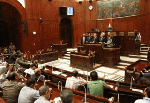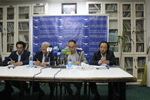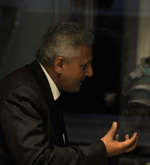Egypt
|
Almost two years have passed since human rights and feminists organizations expressed their deep concern at the escalation of policies that reinforce impunity, do not protect citizens and do not guarantee the right of peaceful assembly. The exclusion of women from the public sphere through direct incitement and aggression must be condemned. The heinous crimes of sexual violence can not be separated from the decline of the social status of women.
The revolution of January 25, as the Egyptians call it, is the fourth in the last hundred and thirty years. The modern national movement has sought an effective national sovereignty, particularly with regard to economy and the ability to ensure socio-economic justice in the distribution of wealth and income. The Egyptian people discovered that without internal democracy it is impossible to preserve the conquests from previous revolutions. January 25 revolution asserts, then, the centrality of democracy, not only as a utopian goal, which practical implementation would be deferred indefinitely, but to lay the foundations of a modern, independent and prosperous country.
|
Published on Mon, 2012-11-26 08:03

Egyptian Constitutional
Assembly. (Photo: ANHRI)
|
The constitutional declaration issued by the Egyptian president Mohamed Morsi last week “contravened the revolution’s goals of democratization and exploited the expansive powers he granted to himself shortly after his election to arrogate unparalleled powers and immunize his decisions against judicial oversight,” warned 22 human rights organizations.
|
Published on Thu, 2012-10-25 10:37

Haggag Nayel.
(Photo: BHRM)
|
Reforming the Interior Ministry is not one of Egyptian president Mohamed Morsy's priorities, which allows police to continue attacking citizens with excessive force, according to 24 Egyptian human rights organizations, among them the Arab Penal Reform Organization, the Human Rights Association for the Assistance of the Prisoners, and the Egyptian Association for Community Participation Enhancement (national focal point of Social Watch).
|
Published on Tue, 2012-09-18 13:26

Photo: EACPE
|
Officially registered with the Ministry of Manpower earlier this month, Egypt’s first labor union of domestic workers is the result of an initiative by the Egyptian Association for Community Participation Enhancement (EACPE, focal point of Social Watch in that country), which launched a project to protect them last year.
|
Published on Thu, 2012-07-05 09:11

Press conference in Cairo.
(Photo: CIHRS)
|
Seventeen human rights non governmental organizations launched on Wednesday officially launched their “Human Rights in 100 Days” campaign to pressure new Egyptian President Mohamed Morsi to follow through on rights of Egyptian citizens.
|
Published on Tue, 2012-06-05 08:02

Seal of the EMMPE.
(Source: EACPE)
|
Despite the previous reservations, the first round of the Egyptian presidential elections held last week “can be described as fair and very close to conforming to international standards of transparency,” according to a broad alliance of civil society organizations and individuals that observed the polls, reported the Egyptian Association for Community Participation Enhancement (EACPE), national focal point of Social Watch in that Arab country.
|
Published on Tue, 2012-05-29 08:38

Magdy Abdel Hamid, from EACPE.
(Photo: European Partnership
for Democracy)
|
The first round vote for Egypt's next president has been criticized last week by international and local election observers who say that restricted access for monitors and minor violations have undermined the overall transparency of the process, reported journalist Nadine Marroushi for the Egypt Independent news portal.
|
Published on Tue, 2012-05-22 18:39

Egypt presidential elections posters
and billboards.
(Photo: gr33ndata/Tarek/Flickr/CC)
|
The Egyptian Association for Community Participation Enhancement (EACPE, focal point of Social Watch in the Arab country) said it would not monitor the presidential elections this week because of the restrictions placed on non governmental organizations by the government.
|
Published on Thu, 2012-03-15 11:39
In terms of gender equity Egypt is slightly above the Middle East and North African average, and far over neighbouring Sudan, although in worst situation than Israel.
|
Published on Wed, 2012-01-25 07:46

Project Rakeeb's symbol.
|
The third round of the elections in Egypt was a meaningful democratic exercise, with relatively few reports of violence or intimidation. The main irregularities were the widespread active political campaigning in and around polling centers, which resulted in sporadic violence, and the denial of access to observers, according to Project Rakeeb, a watchdog program run by two civil society organizations.
|
SUSCRIBE TO OUR NEWSLETTER
Submit

|










